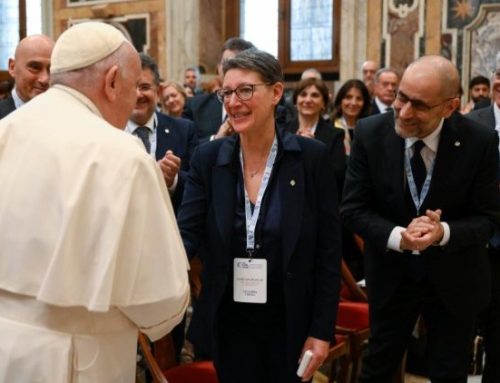26 April 1990
To the members of the “Societas Oto-rhino-laryngologica Latina”
“The “Societas Oto-rhino-laryngologica Latina” held its convention in Rome and was received by the Pope on April 26, 1990. Following is the Pope’s address to the otolaryngologists, originally given in the Italian language.
Ladies and Gentlemen,
I am especially pleased to welcome you on the occasion of the convention which the “Societas Oto-rhino-laryngologica Latina” has held in Rome to allow you to exchange mutual experiences and deepen your knowledge of the developments in the treatment of the many pathological disorders which afflict the ear, nose and throat.
In offering you my cordial greeting, I cannot but recall the prestigious contribution of knowledge and technique made by your meritorious international institution from its very beginning. The importance and nobility of the human organs which are the object of your study and treatment, along with the progress made in the knowledge of the remote and proximate causes of their dysfunction which has such an influence on the general, physical and psychological condition of the individual, are further reason to support and encourage your research involvement, which has made it possible to refine many promising methods of treatment. Neither can we overlook, for some areas of your specialization, applications in the field of plastic surgery, which emphasizes the importance of the location of the organs which you treat, the head, the center of the synthesis of personal individuality.
Today, more than ever, diseases of the hearing, nasal and vocal apparatus take on especially serious dimensions in view of extraordinary forms of communication which technological progress has made possible; in fact, one cannot conveniently take advantage of these if the human organs involved are not in good condition.
Aware of the decisive advantages brought to scientific progress and its practical applications for treatment by the exchange of discoveries, sharing knowledge and combining efforts and initiatives at the international level, I am happy to express my appreciation for your convention, and I urge you to continue on this path of broader and more open sharing.
Quite a few disorders involving the organs in question are indeed the result of other illnesses, as is shown, for example, by the relationship of the endocrine glands, the involuntary nervous system, and the bronchial apparatus. Similar interferences can be seen in the origin and development of the “allergic” illnesses, so widespread today also because of the negative effect of environmental problems. Quite a few of these, when recurring, can develop into illnesses which cause a sense of solitude, isolation and social marginalization in those who suffer from them. Such an evaluation must also be made of the consequence of disturbances affecting hearing and the sense of smell.
It is necessary for the great progress made in research to fin ever broader form of application. Today better living conditions and the contributions of preventive medicine, treatment and rehabilitation have prolonged life expectancy in many parts of the world. Thus an ever greater number of the elderly not only enjoy a longer life, but they should also be able to have precise tasks within the community.
It is known that, precisely in advanced age, hearing, nasal and vocal problems are more frequent. Now these problems not only can be prevented in time, but in many cases they can also be treated effectively. It is necessary for public officials, scientists and health care workers to contribute, each in their own field, to promoting a new social awareness so that the many persons who suffer from loneliness, disability or serious limitations because of the diminished capacity of the organs of hearing, smelling, and speech, may find new possibilities for personal self-worth through proper care.
Another very interesting aspect is the contribution which institutions like yours can make in regard to the dissemination of accurate information about the very serious effect on the young generations, and even on those not yet born, of environmental pollution, including noise pollution. It creates the risk of significantly speeding up the natural decline of the functions of the ears, nose and throat. An erroneous understanding of the progress made in this field of science and a reductive and manipulated view of medicine tend to relegate to the field of treatment that which, in reality, pertains to preventive medicine and to proper health-care education. Much serious damage could, in fact, be avoided, if health-care information were clearer, more thorough, and widespread.
In this field the Church intends to give her concrete contribution, in the awareness that, by correctly using all of his or her functions, the human being, God’s privileged creature, is called to become fully mature in accordance with the mysterious loving plan of the Creator and Redeemer.
How could we not marvel at the wonderful possibilities opened up to the person by these fundamental organs? The Bible and all of world literature exalts them, because with the voice a person can sing God’s praises, express the most noble sentiments, pray and console; by hearing, participation is transformed into communion, into the possibility to receive the message of our brothers and sisters and the sounds of creation; the most noble and refined sentiments and thoughts lead us to pleasant smells. Limitations on the exercise of these faculties, on the other hand, show their great value and help science, which studies their nature and function, to discover all the means capable of assuring their full use to every human being.
With my hopes that, thanks also to this convention, new steps can be made in that direction, I invoke the divine assistance upon all of you, your colleagues and co-workers in every part of the world; as a pledge of this I cordially impart my blessing.
John Pau II









